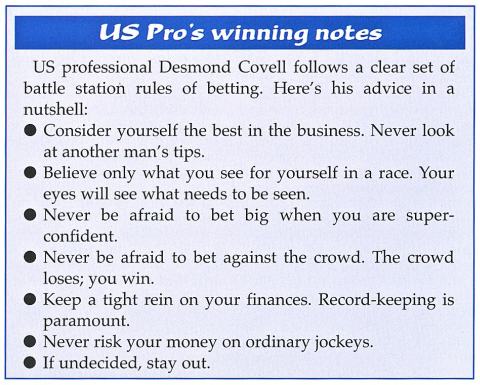English professional Malcolm Smith runs a small tipping service in the UK and aims to make consistent profits. He achieves this by the use of a set of investment rules.
Malcolm recently outlined his approach in the popular UK pocketbook magazine Smartsig. This is how his investment plan is mapped out in Malcolm's own words:
(1) PLAN YOUR SELECTIONS
This goes without saying; all investments should be thought out from the start and planned carefully.
(2) KEEP RECORDS
Use a notebook, a spreadsheet or an application to keep track of what you have selected and how it ran. Can you see a trend appearing? For example, do 1000m sprints return more or less than the 1600m selections?
(3) POSITIVE ATTITUDE
The nature of the game is that not every stake will be a winner. This means, statistically, a losing run will occur. Depending on your strategy, the duration of the losing run will vary, i.e. those who bet in the 7/2 to 4/1 range ought to experience smaller losing runs than those chasing the 16/1 to 20/1 outsiders.
(4) DON'T MIX ACCOUNTS
The best way not to gain any longterm profits in this game is to use your normal day-to-day bank account for racing. Use a totally separate account, and have a second wallet. The two should not mix.
(5) AIM AT HIGHER STAKES
As your profits grow, try to increase your unit stake. As a result, I have about a 2 per cent staking plan, which means that if I had $1000 in my accounts, both bank and the bookies, then I'd be placing $20 bets. Aim to increase the stakes. My personal aim is to buy a house with cash in London next summer. What's yours?
(6) NO FEAR
If you feel a horse has an 80 per cent chance of winning, then don't be afraid to back it at one-half.
(7) HAVE A ROUTINE
Make sure that you, and your family, understand that you may need an hour or two in the evening to choose your bets for the next day. Make a daily routine and focus on the job. When this time comes it's time for some hard, cold decision making for the next day's cards. Work in the right environment; studying the form on a crowded train or bus is not the right way.
(8) WHEN NOT TO BET
You've made your decisions the night before; the last thing you should do is change your bets. If a horse that everyone else is backing is not on your list, then just sit back and watch the race unfold. Often it's all a false signal.
(9) SELF-CONTROL
If you end up in a losing run, don't panic. Sit down calmly and work out where you are going wrong. Keep rational and keep every selection independent of the other.
(10) EXPECT LOSSES
When you lose, accept this fact gracefully. Don't dwell on it or become angry or upset as this will cloud your judgement and will make things worse.

By Brian Blackwell
PRACTICAL PUNTING - FEBRUARY 2001